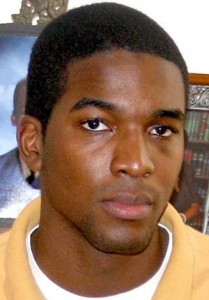
Junior Daren Venable made an appearance at the Monroe County Hall of Justice for a hearing on Tuesday, March 29. Courtesy of www.democratandchronicle.com
On Tuesday, March 29, junior Daren Venable returned to Rochester for a hearing at the Monroe County Hall of Justice. He has been charged with second-degree murder for the stabbing of UR student Jeffrey Bordeaux, Jr., which occurred on Jan. 15, 2011 at a party at the Delta Upsilon Fraternity House. Venable has been living with his family in Brooklyn, N.Y. since being released from jail on $50,000 cash bail.
Venable will plead not guilty to the charges against him, claiming self-defense on the grounds that he did not leave the fraternity house to retrieve the knife he used to assault Bordeaux and only attacked after Bordeaux had begun punching him in the face.
He has already been in court twice following the altercation on the Fraternity Quad, once on Jan. 17 when his lawyer, Brian DeCarolis, entered the plea of not guilty, and again on Jan. 20 for a preliminary hearing in City Court.
Tuesday’s hearing was called to discuss whether the testimony of two police officers concerning statements Venable made to the Rochester Police Department (RPD) the night of the fatal confrontation between him and Bordeaux can be used in his trial on Friday, April 8. This depends on whether or not Venable was aware of his rights.
Judge John DeMarco presided over the hearing. Venable’s defense consisted of DeCarolis and lawyer James Nobles, with Assistant District Attorney Raymond G. Benitez representing the People and the State of New York.
Before witnesses were called, DeMarco asked Venable to confirm that he had decided to waive his right to a jury trial and preferred a bench trial instead.
DeMarco explained that, in a jury trial, jurors selected from 100 perspective candidates would decide the facts of the case, determine credibility, apply these facts to the law and subsequently make a unanimous verdict on the case while the judge would make sure the trial is conducted according to the law. In a bench trial, there would be no jury and the judge would instead be the one to review the facts and evidence and make the final decision.
“Based on [the] court’s allocution, Daren Venable has made the intelligent and informed decision to waive his right to a jury trial … the court will consent to the waiver,” DeMarco said after Venable had reviewed the written waiver of his rights.
Chris Rynders, an officer in the RPD for three years, was called as the first witness. He told the court that he had been on Mt. Hope Boulevard near Alexander Street shortly before 1 a.m. on Jan. 15 on a routine patrol lasting from 11:15 p.m. to 7 a.m., when he received a call and arrived at 555 Fraternity Rd. five minutes later, where he found Bordeaux lying in the grass.
Rynders’ first contact with Venable was when he entered the Delta Upsilon house. He claimed to see no indication that Venable was intoxicated, but admitted that he did not ask Venable if he had been drinking in the five hours they were together.
“I went inside the Frat House.” Rynders said. “There was a large crowd in the living room.―I saw [Venable] in a chair;―his left eye was swollen shut.”
Rynders recounted that he began to question Venable, but only as a witness. When he asked him if he had seen anyone with a knife, Venable only responded, “That’s an interesting question.” After being asked again, Venable answered, “I’m not answering that question.”
Rynders claimed that when a firefighter treated Venable’s wounds, he could see through his body language that Venable had become “slightly agitated.”
“He raised his voice and was evasive — his body language was indicative of getting ready to fight,” Rynders said.
He then placed Venable in handcuffs for the safety of both himself and Venable, although he assured Venable that he was not under arrest and searched him for weapons, finding nothing.
Venable complained soon after that the handcuffs were too tight and Rynders told him that he could remove them, but only if he searched Venable more thoroughly. During this second search, Rynders found a folding knife in Venable’s possession that was four inches long when closed.
Gary Galetta, an investigator at the City of Rochester Police Department in the Major Crimes Unit for 28 years, specializing in death investigations, was called to the stand as the second witness.
Galetta recounted that he had questioned Venable further with audio and visual recording once he was brought to the Public Safety Building. He made first contact with Venable at 8:15 a.m.
Galetta also contended that, although he had seen “thousands” of people under the influence of substances throughout his career, there was no indication that Venable was under the influence of either drugs or alcohol, and that his speech was “clear and audible.”
Venable was read his Miranda Rights verbatim from an RPD notification card by investigator Glen Weathers, who was assisting Galetta. When asked if he understood, Venable responded with an affirmative “uh huh.” Galetta claimed that Venable was cooperative throughout the questioning and never once asked for an attorney.
“Rynders knew [this] was going to be a criminal investigation and never let [Venable] leave his presence … [This is] indicative of custody, even though he says that he told [Venable] he wasn’t under arrest,” Nobles said in his closing remarks. “He was making inquiry of [Venable] about the knife.―This is interrogation.”
Benitez argued against Nobles for the use of the statements.
“Rynders’ actions didn’t trigger the Miranda Rights so clearly he wasn’t in custody,” Benitez said. “It was like an officer stopping a vehicle — clearly [they] are not under arrest,” he said in his closing statement.
A decision on the hearing will be made by DeMarco on Friday, April 11, although Venable’s presence has been waived.
Goldin is a member of
the class of 2013.


